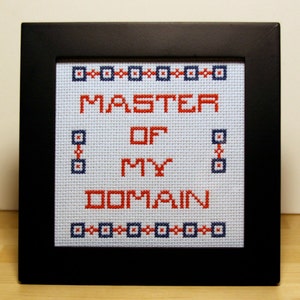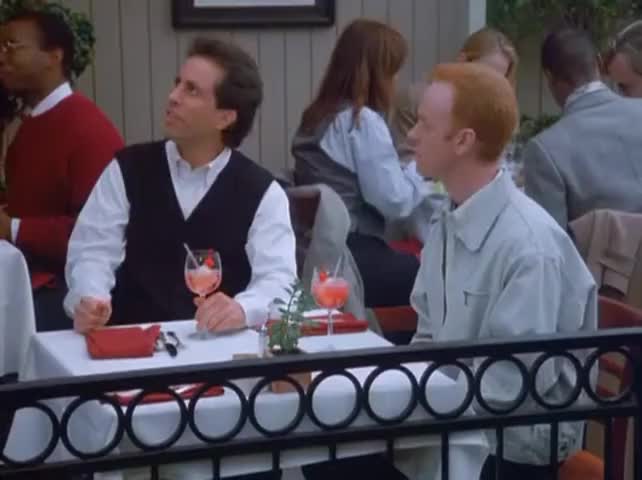

But with four main characters to showcase, a Seinfeld episode needs several stories going at the same time. He proposed an episode in which Jerry goes through similar angst after a bad haircut.ĭavid and Seinfeld liked the idea. “It was like breaking up with your lover,” he says. Andy Robin, 24, a former Saturday Night Live writer who joined the Seinfeld staff this season, remembered the anxiety he felt about switching barbers, from the old man who had cut his hair for years to a younger barber in the same shop. The Barber, like most Seinfeld episodes, expanded from a writer’s real-life experience. Says David: “I like something tiny that just expands.”
#Seinfeld master of my domain tv
A Seinfeld premise is different from that of most other TV comedies instead of a generic sitcom “problem” (Murphy’s mother comes to visit Roseanne hates Darlene’s new boyfriend), Seinfeld typically starts with a small, recognizable life moment that causes outsize anguish. THE SEED: “The hardest part of this show is coming up with the ideas,” says David. Early last month, they gave TIME an inside glimpse of how they bring a Seinfeld episode to fruition.

It is, moreover, the product of two distinct but oddly congruent comic personalities: David, 46, a dour ex-stand-up comic and writer (he appeared in ABC’s failed late-night show Fridays and spent one season writing for Saturday Night Live, where only one of his sketches ever aired), and Seinfeld, 39, a star who is just as active behind the scenes. In reality, the show is more densely textured, elaborately plotted and psychologically astute than any other comedy on TV. It’s that rarity - intelligent comedy that is funny enough for everybody.Īccording to the popular wisdom, Seinfeld is a show about “nothing.” Episodes are spun out of small, everyday trials and tribulations - looking for a parking spot, wearing a funny-looking shirt, trying not to masturbate (last season’s Emmy-winning episode The Contest, in which the characters competed to be “master of your domain”). Against all odds, this hip, insider sitcom about a comedian (Seinfeld playing Seinfeld) and his three Manhattan friends has expanded its appeal beyond a core audience of yuppie tastemakers. This fall, without Cheers’ help, it’s in the Top 5. Last winter, moved to a Thursday-night time slot following Cheers, the show vaulted into the Nielsen Top 10. The private bathroom is a dream come true for him as ewll.Now in its fifth season on NBC, Seinfeld is in its glory days. George spends a good chunk of time pretending to be disabled - going as far as to getting a scooter to ride around New York City on his company's dime. George had to read without his glasses, and the holiday wouldn't end until he could pin his father to the ground in a wrestling match. While it might not seem risqué now, when the episode aired in 1995, this was an edgy topic for a sitcom to tackle.įrank Costanza terrorized his family every year with Festivus, telling them all the ways they disappointed him over the past 12 months. In "The Sponge," Elaine grilled a man over whether he was worthy of using a sponge, her favorite form of contraception that had just been taken off the market. George would go on to use his status as a grieving fiancee to try to land him women. George's response at the end of the episode, "Come on, let's get some coffee," shows that nothing - not even the death of a fiancee - can really affect these self-obsessed people. Susan's death in "The Invitations" did not hit any of the gang hard.

In 1994's "The Hamptons," George screams “I was in the pool!” as a way of explaining why his member might look a little small when Jerry's girlfriend walks in on him naked. In 1993's "The Outing," Jerry and George are incorrectly outed as gay, which they deny - "not that there's anything wrong with that." Today it's easy to forget how little homosexuality was portrayed or discussed in popular culture, but at the time felt like Seinfeld was delving into edgy territory. Part of the brilliance of the 1992 episode was that it never used the actual word. It coined the phrase "master of my domain," with the gang making a bet about who could go the longest without masturbating. "The Contest" is considered by many the greatest episode of Seinfeld ever.


 0 kommentar(er)
0 kommentar(er)
